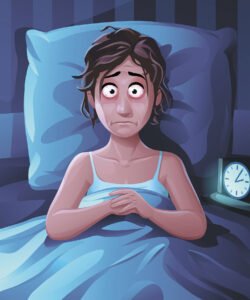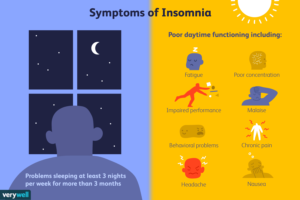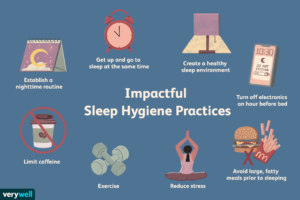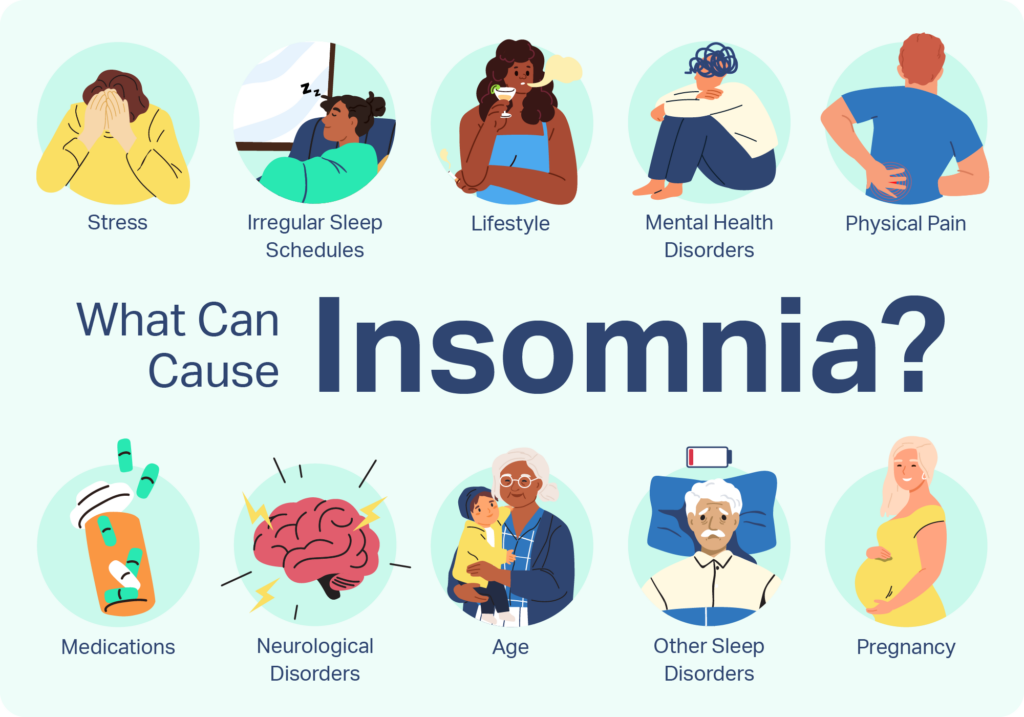Insomnia is when you can’t fall asleep or stay asleep at night. It can make you feel tired, grumpy, and slow during the day. Many people struggle with insomnia, but the good news is that there are ways to improve your sleep!
In this blog post, we’ll talk about what causes insomnia and share some easy tips to help you sleep better. From understanding the reasons behind sleepless nights to learning new habits that can bring peaceful rest, let’s get started on your journey to better sleep!

1. What is Insomnia and Why Does It Happen?
Insomnia is a sleep problem where you find it hard to fall asleep or stay asleep at night. It happens to many people, and it can make you feel tired during the day. Insomnia can last for a short time or even longer, depending on what’s causing it. Sometimes, it can happen because of stress, bad sleep habits, or changes in your life.
Many people with insomnia wonder why they can’t sleep. There isn’t one main cause of insomnia. It could be your body’s way of reacting to stress or a busy mind that won’t slow down. It can also be linked to your health, like having anxiety or depression. The good news is that there are ways to help manage insomnia and get better sleep.
Understanding why insomnia happens is the first step toward fixing it. If you think you have insomnia, it’s a good idea to talk to a doctor. They can help you find the cause and give you advice on what to do next.
2. How Insomnia Affects Your Daytime Energy and Mood
When you don’t get enough sleep because of insomnia, it can affect how you feel during the day. People with insomnia often feel very tired, making it hard to focus on work or school. You may feel like you have no energy, and even small tasks can seem hard to do.
Not getting enough sleep also changes your mood. You might feel grumpy or get annoyed easily. It’s common to feel stressed or sad when you’re tired all the time. This can make it harder to get through the day, and it may even affect your relationships with friends and family.
Dealing with insomnia isn’t easy, but understanding how it impacts your day can help you find ways to cope. With the right help and changes to your routine, you can improve your sleep and feel better during the day.
3. Common Causes of Insomnia: Stress, Habits, and Health Problems
There are many reasons why someone might have insomnia. Stress is a big cause of sleepless nights. When you’re worried about something, it’s hard for your mind to relax, and this can keep you awake. Stress from work, school, or personal life can all lead to insomnia.
Your sleep habits can also affect how well you sleep. If you go to bed at different times every night or use your phone before bed, it can make it harder to sleep. Having too much caffeine or eating large meals late in the day can also cause insomnia.
Health problems like anxiety, depression, or chronic pain can make it difficult to sleep too. If you have any of these conditions, it’s important to manage them so that you can sleep better. Talking to a doctor can help you figure out what’s causing your insomnia and what to do about it.
4. Is Insomnia Dangerous? The Health Risks You Should Know About
Many people don’t realize that insomnia can lead to serious health problems. Not getting enough sleep can weaken your immune system, making you more likely to get sick. It also puts you at higher risk for heart disease and diabetes if it continues for a long time.
Insomnia can also affect your mental health. People who don’t sleep well may experience anxiety or depression. Over time, insomnia can make it hard to cope with stress and emotions. It can also cause memory problems and make it harder to concentrate.
It’s important to take insomnia seriously and get help if you need it. By improving your sleep, you can protect your health and feel better overall. Don’t ignoren as it can lead to bigger health issues down the road.
5. How to Tell if You Have Insomnia: Symptoms and Signs
If you’re having trouble sleeping, you might wonder if you have insomnia. The main signs of are difficulty falling asleep, waking up during the night, or waking up too early in the morning. These sleep problems may happen even when you feel tired and want to sleep.
Another sign of is feeling very tired during the day. You may have trouble focusing on tasks or feel like you don’t have enough energy. can also affect your mood, making you feel more irritable or stressed.
If you notice these symptoms and they last for more than a few weeks, you might have. It’s a good idea to track your sleep and talk to a doctor about your concerns. Getting help early can prevent long-term sleep problems.

6. Can Children and Teens Have Insomnia Too? What Parents Should Know
Insomnia doesn’t just affect adults. Children and teens can have trouble sleeping too. For kids, it can sometimes be hard to fall asleep because of changes in routine, stress from school, or excitement about upcoming events. Teens might stay up late using their phones, which can cause over time.
If your child or teen is having trouble sleeping, you might notice signs like trouble waking up in the morning or being grumpy during the day. They may also have trouble focusing in school. in children and teens can affect their growth and learning.
Parents should encourage good sleep habits, like having a regular bedtime and limiting screen time before bed. If the problem continues, it might be helpful to talk to a doctor who can give more advice on how to help with.
7. Natural Remedies to Fight Insomnia Without Medication
For those looking to avoid medication, there are natural ways to deal with insomnia. One common remedy is drinking warm milk or herbal tea before bed. These drinks can help relax your body and prepare it for sleep. Many people also find relaxation techniques like deep breathing or meditation helpful.
Exercise can also improve sleep. Regular physical activity during the day can help tire out your body, making it easier to fall asleep at night. However, it’s important not to exercise too close to bedtime, as it may keep you awake.
Creating a calm bedtime routine can also help. Taking a warm bath, reading a book, or doing some light stretching can signal to your body that it’s time to rest. By practicing these habits regularly, you might find that becomes less of a problem.
8. Simple Lifestyle Changes to Help You Beat Insomnia
Sometimes, small changes in your daily routine can make a big difference in your sleep. One of the best things you can do is go to bed and wake up at the same time every day, even on weekends. This helps your body get into a regular sleep pattern and can reduce insomnia.
Limiting caffeine, especially in the afternoon and evening, is another helpful tip. Caffeine can keep you awake and make it hard to fall asleep. If you smoke or drink alcohol, cutting back can also improve your sleep.
Making your bedroom a comfortable and quiet place for sleep is important too. Keep it dark, cool, and free from distractions like TVs and phones. These simple changes can help you sleep better and reduce
9. Cognitive Behavioral Therapy for Insomnia: How It Works
Cognitive Behavioral Therapy for Insomnia (CBT-I) is a type of therapy that helps people change their thoughts and behaviors around sleep. It’s often the first treatment recommended for people with chronic because it focuses on solving the root of the problem.
CBT-I teaches you how to manage worries that keep you awake. For example, some people with get anxious about not being able to sleep, which makes the problem worse. CBT-I helps you relax and feel more confident about your ability to sleep.
It also includes practical advice on building better sleep habits, like creating a regular sleep schedule and avoiding naps during the day. Many people find CBT-I to be a very effective way to treat without medication.
10. The Role of Sleep Hygiene in Preventing Insomnia
Sleep hygiene is all about building good habits that promote healthy sleep. It’s one of the most important ways to prevent. One key tip is to avoid using screens before bed. The blue light from phones, tablets, and TVs can interfere with your body’s ability to fall asleep.
Another part of good sleep hygiene is making your bedroom a sleep-friendly space. Keep it quiet, dark, and at a comfortable temperature. You should also use your bed only for sleep and relaxation, not for watching TV or doing work.
Finally, pay attention to what you eat and drink before bed. Heavy meals, caffeine, and alcohol can all make it harder to fall asleep. By following these tips, you can create a routine that helps prevent and improves your overall sleep quality.

Conclusion
Insomnia can make it hard to sleep, but there are many ways to improve your rest. By understanding what causes insomnia and making small changes in your daily habits, you can sleep better at night. Things like a regular sleep schedule, a calming bedtime routine, and a comfortable bedroom can make a big difference.
If you’re still having trouble with don’t be afraid to ask for help. A doctor or sleep expert can guide you in finding the best solutions. With patience and practice, you can overcome and wake up feeling refreshed and ready for the day!










